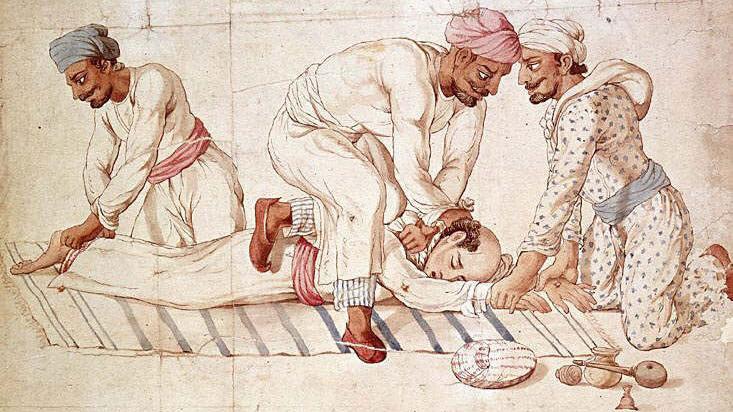The word ‘thug’ has a surprising origin
A 19th-century watercolor by an unknown Indian artist depicts three Thugs strangling a traveler. The now-loaded term has its origins in India.
"Thug" is clearly a loaded word.
It's surfaced a lot in recent months, usually surrounding protests against the deaths of young black men in various American cities. And it's back in the news this week as rioters in Baltimore were tagged as "thugs." Even the city's mayor, Stephanie Rawlings-Blake, used the term, though she softened her comments on Wednesday.
So it may be a surprise that the word originates far away, in India.
"As far as I can tell, thug goes back to the 14th century," says Megan Garber, who traced the word's origin for a story in The Atlantic. "There was a gang of criminals known as the thuggee."
Garber says the Thugs were a huge criminal network that operated all around India's main roads. "They would basically befriend travelers along the roads, gain the travelers' trust," she says. "And then they would murder them, usually by strangulation, and steal their valuables. It was all very violent."
Mark Twain was one of the first Americans to report on the group: Observations about the Thugs appeared in his book, "Following the Equator: A Journey Around the World." Published in 1897, the book started the steady rise of "thug" in popularity and usage in American English.
In the United Kindgom, the Thugs were much better known, thanks to British colonial rule of India
Former Prime Minister Margaret Thatcher used the word decades ago with relative frequency. "Thugs" were everyone from unruly soccer fans to people involved in race riots.
Garber says the word thug actually rebounded in American popular culture, thanks in part to "Indiana Jones and the Temple of Doom." "There was a plotline that involved kidnapping by way of thugs," she says. "A lot of Indian Americans actually protested the portrayal of the thugs in that movie, but that sort of brought it back into the cultural presence again."
Then hip-hop took the word: Tupac had it tattooed onto his body, and Cleveland's Bone Thugs-N-Harmony sent the word into cars and living rooms across the country.
In this conception of the word, Garber writes, thugs "are both victims and agents of injustice. They are both the products and producers of violence, and mayhem, and outrage."
She's also been listening to how people have been using the word in the Baltimore riots. "It's this very effective way of suggesting that the people who are doing the rioting and who are being called thugs don't actually have a right to their outrage," she says.
That's partly why there's widespread disgust in the African American community over its use. Just take this response Baltimore Councilman Carl Stokes gave to CNN's Erin Burnett over the word:
oembed://https%3A//www.youtube.com/watch%3Fv%3D94Unzb42NzI
But Garber isn't surprised the word has become so loaded.
"In some sense, the history of language is about people trying to wield power over other people," she says. "And so this is just one more example of that strife and that effort."
Every day, reporters and producers at The World are hard at work bringing you human-centered news from across the globe. But we can’t do it without you. We need your support to ensure we can continue this work for another year.
Make a gift today, and you’ll help us unlock a matching gift of $67,000!
